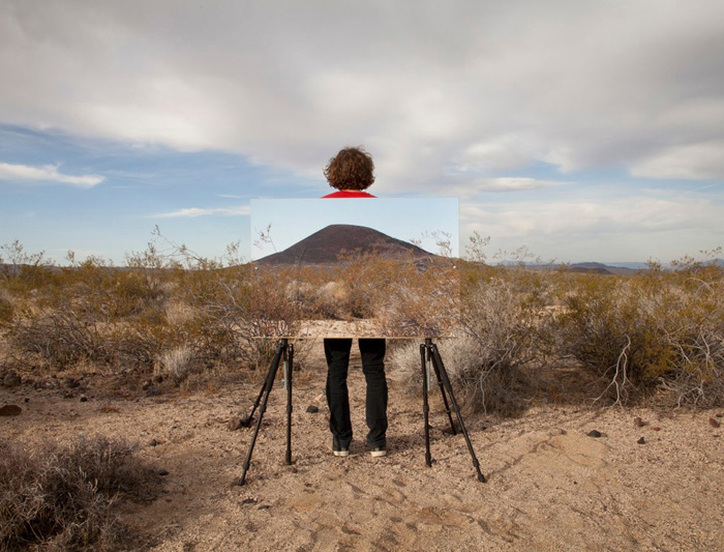| Richard T. Walker’s three-channel video projection, the speed and eagerness of meaning (2011), sees the artist wandering across the epic expanses of the Mojave Desert on a quest for revelation; a pilgrimage in search of the sublime. As he traverses the vast barren landscape, a monologue describes the insurmountable chasm he encounters between meaning and affect: | - As you try to assemble what is now before you, you mourn a little for what you have lost, for you could never again acquire the not knowing that so beautifully placed you in the centre of it all. Now you can only draw parallels, assign differences, translate things into opposites, find commonalities, draw distinctions and embrace the overarching failure of all this togetherness. |
Walker has made his way to this remote corner of the globe from his native Britain in order, in that most clichéd of fashions, to find himself, to be ‘at one’ with the world. And yet, as he begins to experience the reality of his vision of unbound nature, he cannot help but collapse what he sees back again onto a familiar pictorial plane, constrained by language and proportion. The compulsion to command and compartmentalise nature appears overpowering, cementing man’s place at the centre of the world, imposing order like one of those “frock coats” so despised by Bataille (who instead envisioned an essentially formless universe).
The great American landscape has long resonated in popular culture as a site of ultimate romantic escapism, from the seductive wilderness of Marlboro Country advertisements, to countless film and television productions. Walker himself cites ‘couple on the run’ movies such as Badlands, Bonnie & Clyde, Gun Crazy and Natural Born Killers, where “the theme seems to be that in order for the couples to be together they are forced to transgress, often committing successive crimes and escaping civilization for the limitless bounds of the American landscape. It is only here that their love can exist.”
But in Walker’s works we find no violence, no romanticised form of Bataillean transgression that might act as an ultimate gateway to the Real. The subject of Walker’s love is instead the landscape itself, his works centring on an intense, solitudinous relationship with nature. He engages in the pathetic fallacy, anthropomorphising the land as an entity capable of reciprocating his desires. And yet the landscape remains impassive; a love destined to be perpetually unrequited.
Link to full article: http://www.metamodernism.com/2013/03/13/in-pursuit-of-elusive-horizons/
The great American landscape has long resonated in popular culture as a site of ultimate romantic escapism, from the seductive wilderness of Marlboro Country advertisements, to countless film and television productions. Walker himself cites ‘couple on the run’ movies such as Badlands, Bonnie & Clyde, Gun Crazy and Natural Born Killers, where “the theme seems to be that in order for the couples to be together they are forced to transgress, often committing successive crimes and escaping civilization for the limitless bounds of the American landscape. It is only here that their love can exist.”
But in Walker’s works we find no violence, no romanticised form of Bataillean transgression that might act as an ultimate gateway to the Real. The subject of Walker’s love is instead the landscape itself, his works centring on an intense, solitudinous relationship with nature. He engages in the pathetic fallacy, anthropomorphising the land as an entity capable of reciprocating his desires. And yet the landscape remains impassive; a love destined to be perpetually unrequited.
Link to full article: http://www.metamodernism.com/2013/03/13/in-pursuit-of-elusive-horizons/
